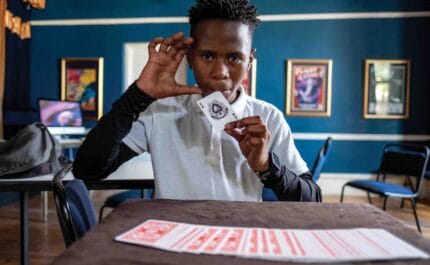Pitch battles
As the 2014 World Cup qualifiers drew to a close in November 2013, James Montague returned to an extraordinary round of matches which pitted several sworn enemies against each other. The race to represent Asia in the 1994 World Cup saw Iraq, Iran, Saudi Arabia, North Korea and South Korea battle for a place in the finals in the US. This is the story of the Miracle of Doha
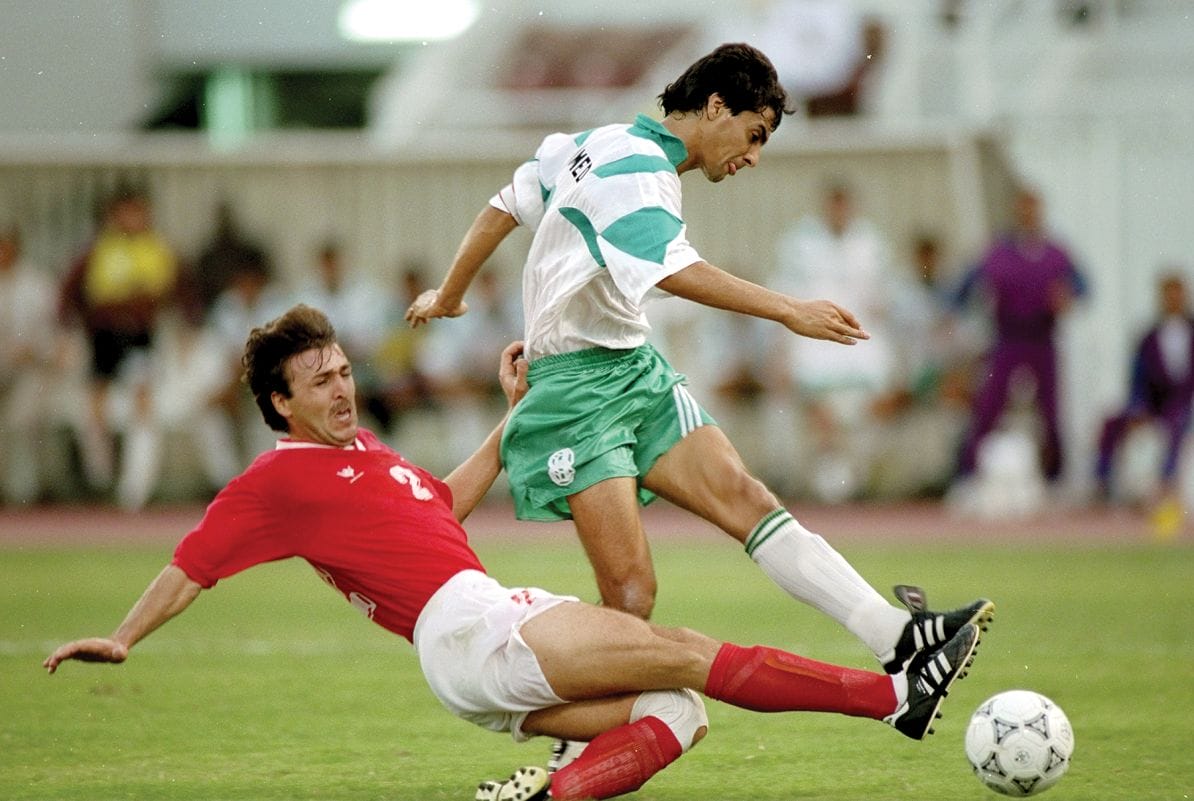
Javad Zarincheh of Iran takes on Ahmad Radhi of Iraq during a World Cup qualifying match in Doha, Qatar, 22nd Oct 1993. Photo: Getty
20th November 2013 (Taken from: #13)
Doha, Qatar. 28th October 1993. 5.59pm
Hans Ooft looks every bit like a man who is about to have a heart attack. His rotund, middle-aged frame is in perpetual motion; walking, hopping, kneeling, spinning and crouching as the football match playing out in front of him reaches its frenzied, scrappy and vital conclusion. The stands of the Al Ahly stadium in Doha, Qatar are half full but noisy. Thousands of Japanese football fans have come to this tiny, barren peninsular in the Persian Gulf to see their team make history and they are minutes away from witnessing precisely that.
Ooft is the first foreign coach of the Japanese national football team. The Dutchman has been tasked with one job: to take the Blue Samurai to their first ever World Cup finals, to be held in 1994 in the United States. Japan has historically been Asia’s footballing minnow, overshadowed by the teams of the Middle East, and even North and South Korea. But in the past two years things have started to change thanks to the J-League, a new, big money professional domestic competition. England’s record goalscorer Gary Lineker and a host of big name foreign players have joined the league, giving it instant profile. And just a year earlier Japan won its first ever Asian Cup, the continent’s equivalent of the European Championships, beating Saudi Arabia 1-0 in the final. The thousands of fans, including 300 Japanese journalists who have travelled halfway across the world, expect qualification. So, increasingly, does Hans Ooft.
The match is about to enter its 90th minute and Japan are beating Iraq 2-1. As things stand, they will go to the World Cup finals. It has been a gruelling fortnight, with two weeks of matches between Japan, Iraq, Iran, North Korea, South Korea and Saudi Arabia in a round robin tournament to determine which two teams will qualify. The schedule of matches alone is exhausting enough. But almost every game also seemed like a diplomatic incident waiting to happen.
Three of the teams – Iran, Iraq and North Korea – are still under US sanctions, which means it’s uncertain if they’d be allowed to compete in the finals if they qualified”
It is just three years since Saddam Hussein invaded Kuwait and sparked the first Gulf War, in which he also fired scud missiles at Saudi Arabia. It has only been five years since the end of the Iran-Iraq war, one of the most destructive conflicts of modern times, in which up to a million people died in trenches surrounded by the fog of chemical warfare. North and South Korea have resumed hostilities too; just weeks before the tournament the CIA estimated that North Korea had amassed 12 kilogrammes of plutonium – enough for two of the nuclear weapons they had previously threatened their neighbours with. Saudi Arabia and Iran have a historical rivalry due to their Sunni/Shia, Arab/Persian differences. And finally, colonial resentments linger from the Japanese empire’s cruel occupation of its neighbours until the end of the Second World War.
Three of the teams – Iran, Iraq and North Korea – are still under US sanctions, which means it’s uncertain if they’d be allowed to compete in the finals if they qualified. It’s all so politically sensitive that the US State Department has sent a representative to Doha to keep an eye on things.
In terms of footballing prowess the teams are hard to separate. As the final round of games begins, every team can still qualify – with the exception of North Korea. Japan only need to hold on for a few more minutes in their match against Iraq to make it through. In the 90th minute Hans Ooft finally calms down, the game seemingly won. He sits back on his bench, his white linen jacket rolled up to the elbows. He pulls out a packet of cigarettes, lights one and inhales deeply.
Elsewhere in Doha, South Korea are comfortably beating North Korea, meaning the weary Iraqi players know that it’s now impossible for them to qualify. When Iraq unexpectedly push forward in the final moments of the game, the choreographed, celebratory songs and drums of the Japanese fans are the only sounds that can be heard. Even when an Iraqi winger receives the ball on the right, shimmies, beats his man and delivers a high looped ball into the opposition penalty box, the Japanese appear to have things under control. Yet, out of nowhere, an Iraqi head rises up. Jaffar Omran Salman, a half time substitute, knocks the ball high. It slowly arches over the head of goalkeeper Shigetatsu Matsunaga. Hans Ooft extinguishes his cigarette.
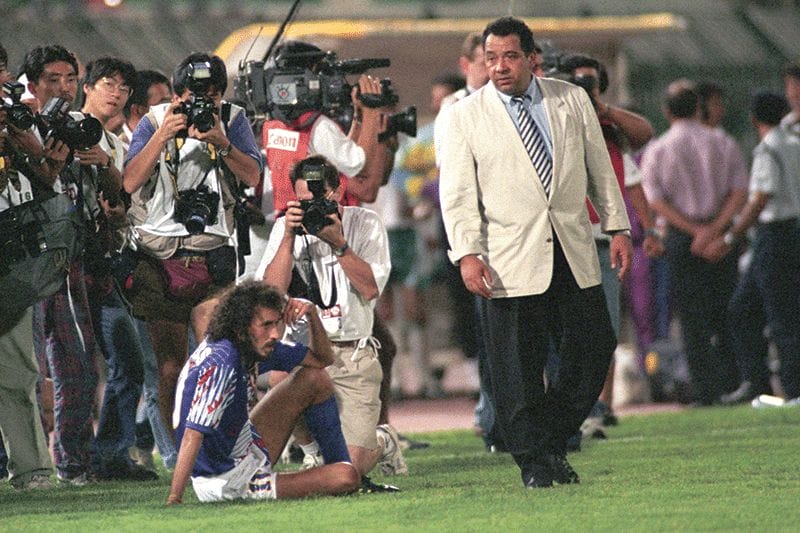
Japan head coach Hans Ooft consoles naturalised Japanese player Ruy Ramos after the match between Japan and Iraq at Al-Ahly Stadium on 28th October 1993. Photo: Etsuo Hara/Getty
When results and fate combined to create one of the most politically explosive sports tournaments in history, its organisers claim not to have been worried. “There was no specific action taken because there was no tension,” claims Sepp Blatter, then FIFA general secretary, now the organisation’s president.
But one of the referees who oversaw the games, Ion Craciunescu, has a different take. “The pay we received from FIFA was double what we would normally get,” he tells me in a café in his home city of Bucharest. “When we got there Blatter told us that we could expect a real horror tournament.”
Craciunescu had a lot of experience of operating under tough conditions. As a young referee in communist Romania he had to negotiate a minefield of corruption and manipulation from the authorities, team owners and players. He was once beaten unconscious after refereeing a match in a remote mining town in the north-east of the country. On another occasion he was threatened with arrest by the country’s feared secret police, the Securitate. Being an international referee in 1980s Romania meant being clean and maintaining standards of dignity, transparency and honesty that no one else in the country seemed too bothered with.
Could an Iraq team run by the odious Uday Hussein be heading to the country his father had recently been at war with?”
He was the perfect person to take charge when Iraq played Iran. Iran had made it to one World Cup finals tournament in 1978 where they famously drew with an overconfident Scotland. But that was under the Shah’s rule and the 1979 Islamic revolution had spelt the end for that team, many of whom had fled the country. When the Iran-Iraq conflict broke out, the domestic league was suspended. All men of fighting age were needed on the front line. “The big issue was to try to ensure fair play so that war didn’t erupt on the pitch,” Craciunescu explains. He went in hard. “I gave many yellow cards,” he recalls with a guilty smile. “I remember, when anybody did anything, just the smallest thing, I’d give a card.” His severity did the trick. The match passed without incident. Iraq won 2-1.
The victory caused waves beyond the Gulf – could an Iraq team run by the odious Uday Hussein be heading to the country his father had recently been at war with? FIFA remained nonchalant. “We had no concerns about any team qualifying,” claims Blatter. “We had received assurances from the US authorities, by President Clinton, that any team would be warmly welcomed.” Craciunescu agrees that no one tried to pressure him into anything. But, in four words, he summed up what was being said off the pitch, in the corridors and in the backrooms: “No. Terrorists. In. America.”
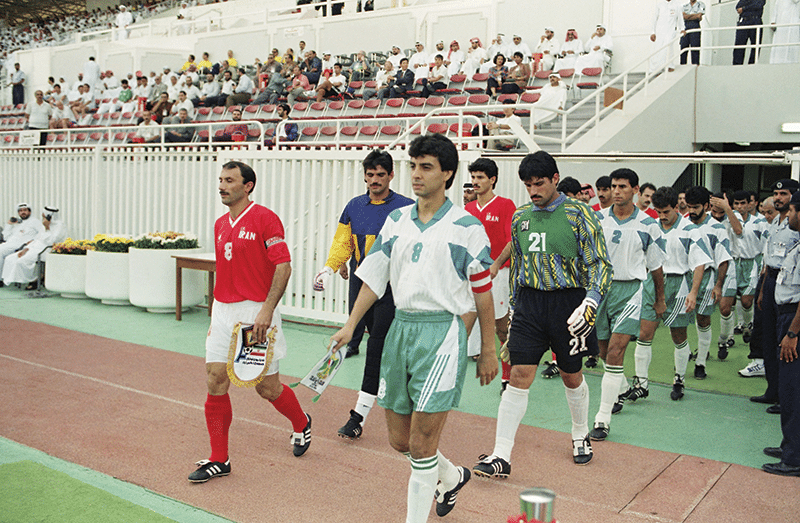
Iranian captain Hamid Derakhshan, left, and Iraqi captain Ahmad Radhi, right, lead their teams on to the pitch at Khalifa International Stadium in Doha, Qatar on 22nd October 1993. Photo: Urhan Ozbilici/AP/Press Association Images
The first World Cup finals in the US would have taken place in an atmosphere of almost total indifference if it hadn’t been for Alan Rothenberg. A lawyer by trade, he became head of the United States Soccer Federation and was put in charge of bringing a tournament revered around the world to a country that was largely apathetic about it. At the turn of the 1990s, soccer was of little interest to most Americans. The brief hysteria that followed the short-lived North American Soccer League of the late ’70s and ’80s – when Johan Cruyff, Franz Beckenbauer and Pelé drew huge crowds – had died away, as had the league.
Soccer was unpopular, unimportant and played only by amateurs. “We had to educate the public and tell them what the World Cup was,” recalls Rothenberg. “It was a massive public relations job.” The cost of hosting football’s centrepiece event was also a problem. “The federation was nearly bankrupt,” he says. “We had to organise the World Cup with no one on staff.” He embarked on an ambitious programme not only to host the tournament but to revolutionise US football. “We rebuilt the federation and organised the World Cup and a new pro league to start from scratch when the World Cup finished. It was a 24/7 scramble by a lot of people.”
By October 1993 Rothenberg was close to realising his dream. Major League Soccer would soon be born. The stadiums were ready. Top celebrities had been drafted in, from the draw in Las Vegas – which featured James Brown, Robin Williams and a video message from Bill Clinton – to the opening ceremony, at which Diana Ross would sing. All was going to plan. And then Rothenberg was told about the tournament in Doha. “We were holding our breath,” he says. “Three countries, Iran, Iraq and North Korea, who had no love for the United States – and the feeling was mutual – had a chance to qualify.”
That day became known in Japan as the ‘Agony of Doha’, a day of national shame that would hang around the players’ necks for the rest of their careers”
Clinton may have promised FIFA that the players and managers of any country would be welcome, but such a prospect raised huge security concerns. Rothenberg had to make contingency plans just in case. “We were gearing up for the worst and we had a special budget for those teams,” he says. “We had to check everyone for terrorism links. It would have cost millions and millions of dollars.”
At least one potential headache was avoided, though. There was another team Rothenberg was hoping would not qualify – England, because “It was a time before the Europeans had controlled hooliganism.” Happily for Rothenberg, Graham Taylor’s England side lost a vital game in the Netherlands on October 13th and failed to make it through.
As the Doha tournament reached its conclusion, Iran and Iraq, two of America’s greatest and gravest enemies, were still in the running. “I watched it all like a hawk,” Rothenberg recalls.
More than one person had told me that Hans Ooft was dead but he is alive and well, and living in God’s waiting room – Florida. Ooft is retired, having given up the game in 2011 after a brief return to Japanese club football. The highlight of his career, or at the very least the closest he had flown to the sun, was taking Japan to the Doha tournament. “I had a nice bunch of players, all 25 to 30 years old and I knew I could do something,” he says in a heavy Dutch accent. He laughs the deep, heavy, rasping laugh of a lifelong smoker. “For the first time in its history Japanese soccer got some results. They launched the J-League so everything was coming together. In 1992 we won the Asian Cup. We knew in 1993 we’d have a lot resistance to qualify [for USA ’94] because we were the target now.”
The Doha tournament didn’t start well for Japan. A goalless draw against Saudi Arabia was followed by a 2-1 defeat to Iran. “The Iranians went for our playmaker, [Brazilian-born] Ruy Ramos,” Ooft says, sounding annoyed for the only time during our interview. “They kicked him whenever and wherever they could so we lost.” The bad results, though, had a galvanising effect on his team. “It was very strange,” he remembers. “After the Iran defeat I said ‘We have to win every match. Every match is a final. The pressure was gone. We won against North Korea and South Korea. But the pressure reappeared for the final match.”
Ooft recalls the Iraq game methodically, as if remembering the exact sequence of events out loud for the first time since. The Iraqis were, he says, much the better team. “Maybe they were getting pressure from the [Iraqi] government. We didn’t play so good. But we scored, 1-0. At half time we were really nervous. I said ‘Hey guys, we are 1-0 up, we are 45 minutes away from the United States.’ Then it’s 2-1 with 15 minutes to go. But still you could see we could not control the match.”
At the moment Ooft lit his cigarette, Saudi Arabia had just qualified by defeating and thus eliminating Iran, and the South Koreans were beating North Korea but were relying on Japan dropping points. “Time was up,” Ooft remembers. “But it dragged on and on. And then I saw the Iraqi centre forward coming up the pitch…”
After Iraq equalised, Japan’s players collapsed on the pitch. They lay motionless, their hands covering their faces, like robots whose batteries had been yanked out. “I knew in that moment it was over,” says Ooft. “Because the moment the referee would blow to restart he would blow again. It was over. Shit.”
That day became known in Japan as the ‘Agony of Doha’, a day of national shame that would hang around the players’ necks for the rest of their careers. Afterwards, Ooft walked onto the pitch and tried to bring some order to the chaos. “My job is not over when the referee blows his whistle. I had to go and pick up my players, who were devastated,” he says. “A lot of these players knew it was their final chance to make it to the World Cup.”
Japan’s agony was South Korea’s ecstasy. Elsewhere in Doha, referee Ion Craciunescu had been overseeing North Korea versus South Korea in an oddly convivial atmosphere. “South Korea’s qualification depended on Japan’s game and I honestly think that the North Koreans were very kind to the South Koreans,” he says. South Korea needed to win and pray that Japan somehow didn’t beat Iraq. “When the Korea game ended the Japan result was not known,” Craciunescu recalls. “We had finished the game. The players had shaken hands and South Korea had won 3-0. They [the South Koreans] left the pitch with their heads down.”
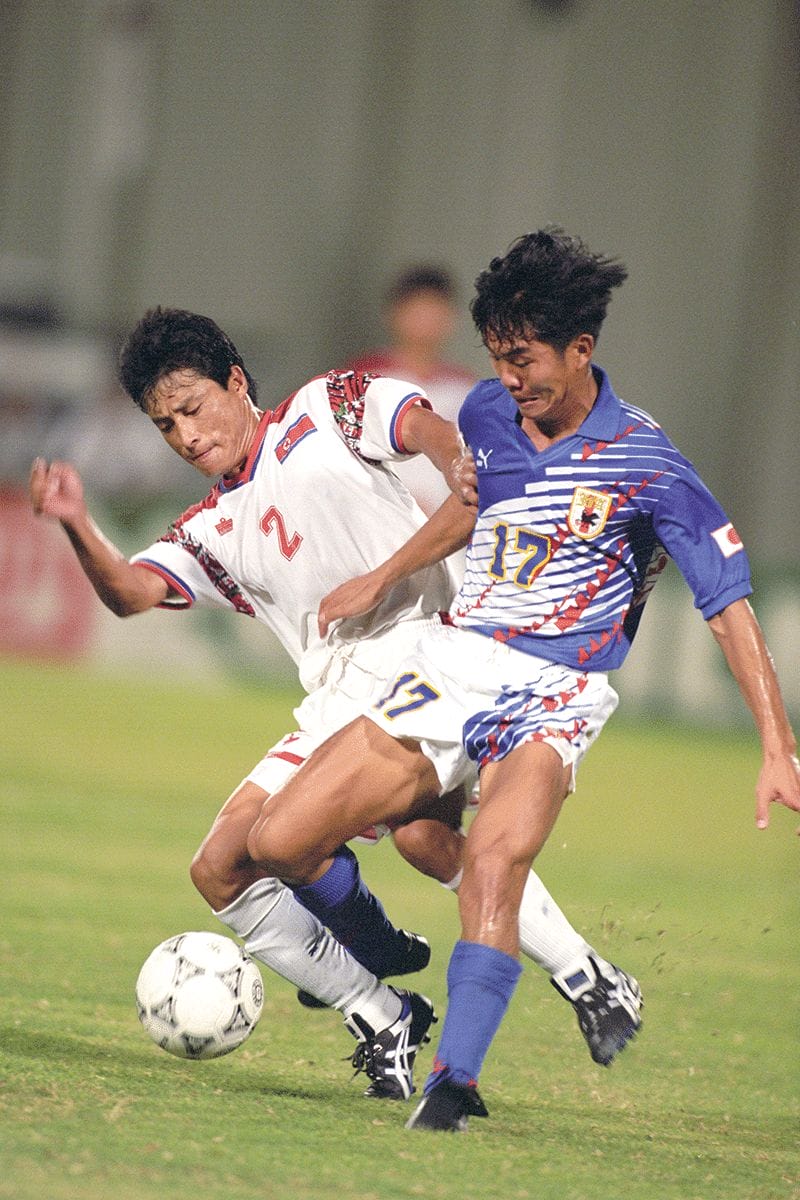
Japan v South Korea at the Khalifa International Stadium, Doha on 25th October 1993. Photo: AP/Press Association Images
But suddenly the mood changed. News had come through that Iraq had scored. “The South Koreans started jumping up and down in joy. And I actually saw that the North Koreans were kind of happy for South Korea because they had heard what had happened to Japan.” The two nations’ players talked, smiled and congratulated each other on the pitch. After all the talk of war, the two sets of players had found common ground in their shared heritage. For Craciunescu it was a beautiful moment, a sentiment echoed by Sepp Blatter. “Sport has this extraordinary power to build bridges in society,” he says. “Football connects people, as you hear me say often. Not because it sounds nice, but because I firmly believe in this. I never considered this line-up as a politically combustible mix!”
Alan Rothenberg might not agree. “[Saudi and South Korea qualifying] saved a lot of money and headaches,” he admits. “[If Iran, Iraq or North Korea qualified] it would have put a different flavour on the tournament. The bad side of international relations would have been there. It was a festive occasion and everyone was there for a good time. The presence of armed forces would have dampened the enthusiasm. There would have been less of a party mood.”
The 1994 World Cup was a huge success. Brazil won, beating Italy 1-0 in the first final to be decided by a penalty shootout. More than 94,000 people watched the final at the Rose Bowl in Pasadena, LA. Saudi made it to the second round but will be remembered for Saeed al Owairan’s goal against Belgium, where he slalomed through the entire Belgian team before scoring one of the greatest goals in World Cup history. He would later be arrested and jailed in Saudi Arabia for carousing with women and drinking alcohol.
The Iraqi team returned home and it later emerged that the players had been regularly and brutally tortured by Uday Hussein for perceived poor performances. When US forces broke into the basement of the Iraqi Olympic Committee headquarters after the 2003 invasion of Iraq, they found a rack and medieval torture devices. For their failure to make it to USA ’94, the Iraq team was forced to play a game with a concrete football while Uday watched.
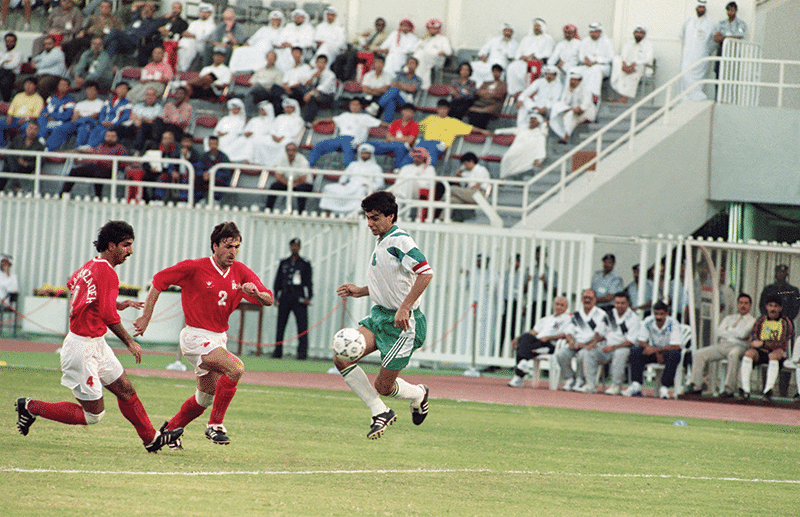
Iran’s Javad Zarinchech (centre) and Iraqi captain Ahmad Radhi (right) during their World Cup qualifying game, 22nd October 1993. Photo: Santiago Lyon/AP/Press Association Images
Iran would qualify for the 1998 World Cup in France and famously beat the US, triggering huge celebrations in Tehran. North Korea would eventually make it to a World Cup finals too, in South Africa in 2010. In Qatar the largest gas field in the world was discovered, sparking a boom that would lead to it securing the right to host the 2022 World Cup finals.
And what of Ooft? Following Japan’s defeat he had just half an hour with his players before facing the music at the press conference. “I could see all the crying faces of the Japanese press. That was not nice. It was very emotional.” It wasn’t until he had flown back to Japan 24 hours later that the defeat hit him. “That was the moment, when the press at the airport asked me how I felt. And it was the first time I’d thought about it. I told them: ‘I feel empty.’”
Ooft was fired but remains philosophical. “Maybe it wasn’t the right thing for Japanese soccer,” he says. “What could we have done in America? We would have been underdogs. Maybe they had to wait four years more. We didn’t make it but we made a lot of progress.” He may be right – Japan are now the best team in Asia and the Blue Samurai will be a dark horse in Brazil this summer.
In South Korea, 28th October 1993 is forever known as the ‘Miracle of Doha’, the day that victory was snatched from the country’s former colonial oppressors. But they are not the only ones to believe in divine intervention that day. “North Korea, Iran, Iraq – they all came pretty darn close!” chuckles Rothenberg. “The fact that they didn’t qualify was a godsend.”
Slow Journalism in your inbox, plus infographics, offers and more: sign up for the free DG newsletter. Sign me up
Thanks for signing up.

